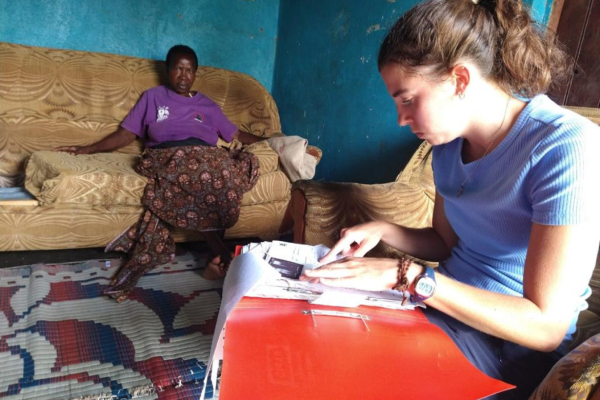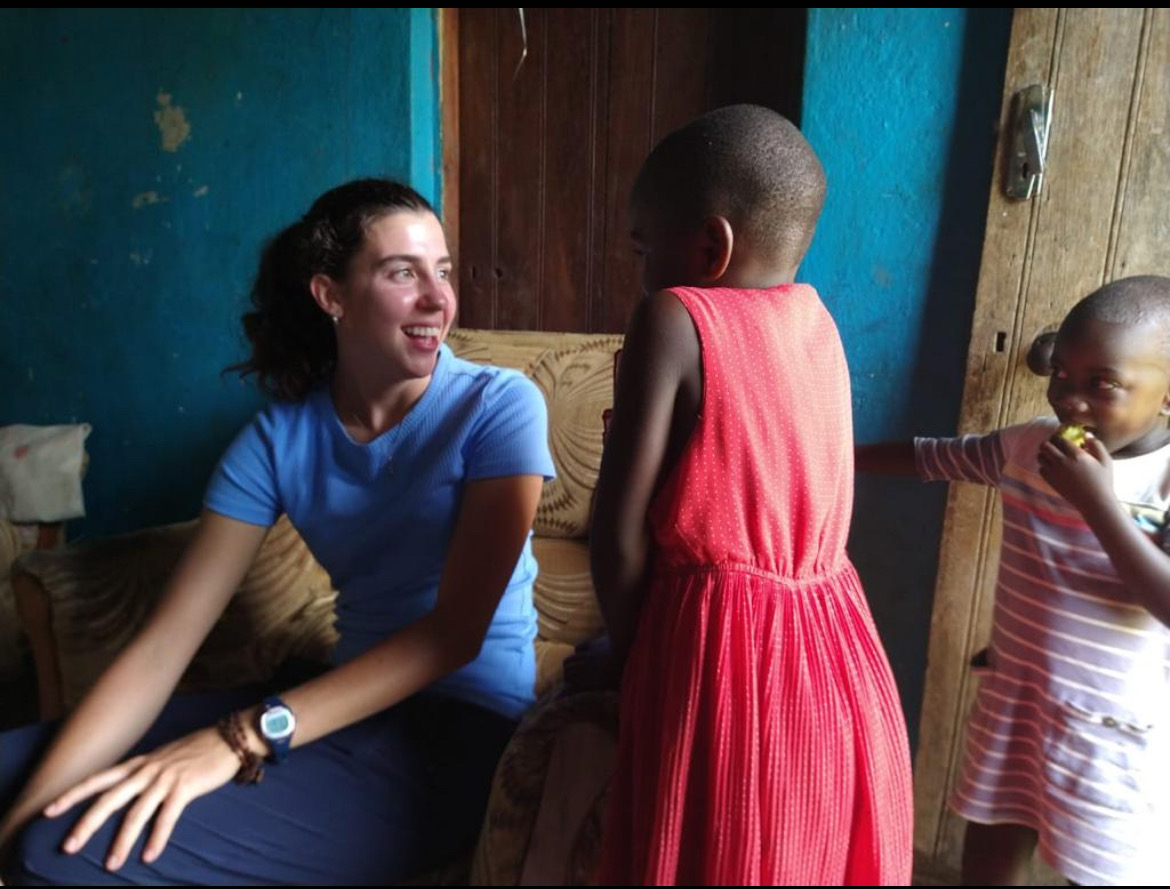
Claire Salyer Interview (American Missionary)
Can you describe your initial motivations and expectations for your missionary trip to Uganda? How did the experience align with your expectations?
I was motivated to go to Uganda from previous mission experiences I had through Franciscan University. I went to Belize twice on spring break mission trips, helping with the SOLT (Society of Our Lady of the Most Holy Trinity) community there. We taught theology of the body in schools and witnessed what life in relationship with the Lord as a young adult practicing the faith looks like.
These missions gave me such fulfillment and purpose that was greater than anything I had experienced. I saw a deep joy and freedom in the people we served even though they lived in such poverty. I realized this is because they knew what was truly valuable in life. Honestly, I did not go to Uganda with many expectations, in fact I really knew very little of what life in Uganda is like. I was ok with this approach because I knew God had called me to go, He opened all the doors in the process of getting there, and I wanted Him to show me Uganda from His perspective, with His eyes. I trusted that He was in charge of this mission and would make it clear to me what I needed to know when I needed to know it.
My experience in Uganda confirmed what I had learned in previous missions with an even greater depth. It is true that in giving we receive, I received much more than I could have imagined..png)
What specific projects or activities were you involved in during your time in Uganda, and how did they impact the local communities you worked with?
The first couple weeks I was in Buluba village volunteering at St. Francis Hospital, which the Little Sisters of St. Francis (LSOSF) are in charge of. This experience helped me to understand what life is like for Ugandans: the deep poverty in which they live, the lack of knowledge and resources, the struggle to live just to make it through the day. I worked in the outpatient department where we took the patient’s vitals and triaged them to the appropriate department. I did rounds on the inpatient wards with the doctors and got to know the stories of the patients.
Next, I spent a week in Nkokonjeru volunteering with Caritas. I got to learn the mission of Caritas- how it works to provide impoverished children with education by sponsorship. This experience actually brought me to see the day-to-day life of Ugandans. With Caritas, I went into the villages and visited the homes of children Caritas has sponsored..png)
Most families are peasant farmers, and not only is this their source of food but also their income. You grow what you eat in the plot of land you own. Unfortunately, the crops planted are not even enough to feed the family, let alone bring in money. This leads to malnourishment, which is very common and lack of education (no income to support).
To help address this problem, Caritas focuses on education. In visiting the homes, I got to understand from the family’s perspective the problems that existed. I visited some of the schools that Caritas children attend, this provided me with a better understanding of the education system. I also learned other projects Caritas conducts for the community including water well installations and chicken coup construction (this allows the family to have food as well as income).
My last two weeks I volunteered at the Hope & Healing Center located in Kiwanyi village. Here I helped at the medical facility. I was impressed with the mission of the facility- it works to empower the community by way of education and example. It emphasizes the importance of the family unit and the role that plays in community empowerment. The employees are local. Since the hospital’s start, there has been definite improvement in the health and wellbeing of the community, much of it has stemmed from greater awareness and education of disease prevention.
Can you share any memorable moments or experiences that had a significant impact on you during your mission work in Uganda?
Although very simple, the experience of greeting people was very powerful to me. In many of the settings I was in, there was a language barrier. In school the children learn English, but because many children cannot afford education, they do not know English. So I began learning the greeting phrases in the native language, Luganda.
One thing that surprised me is how the natives greet each other. They stop what they are doing, even walking, and face each other, looking each other in the eye, and just say “Good morning, sir/madame”, expressing the nicest smile. This meant a lot to me. Despite the physical poverty and worry of getting nourishment, these people saw the value of life and the gift of humanness. They could take a breath of air and acknowledge the person passing them because they understood that person was worth something great that could not be priced. They knew that person held dignity.
How did you address cultural and language barriers while working in Uganda? Were there any challenges in communicating with the local communities?
Even though at times I could not communicate, a smile was worth everything. The people welcomed me so beautifully. Something interesting about their culture, traditionally children and women kneel before the guest/elder/respectable figure as they greet. This is a practice of respect and admiration. Being greeted in this manner, I had a hard time because I wanted them to know I was no better than them. I thought I should kneel before them!
.png)
What were some of the most pressing needs you observed within the impoverished communities you served, and what strategies did you employ to address these needs?
Honestly, I have had many moments of being very overwhelmed because the problem is so great, affecting the majority of Ugandans. I thought, “Where/how do I even begin?”.
There is malnourishment everywhere, sicknesses that are preventable and treatable but unfortunately lead to death, children abandoned/orphaned. I have been reminded that ultimately God is in charge, He knows the needs of His people, He provides. It is not up to one person to solve this; in fact, it is impossible for man to find the solution. “With God all things are possible”- man with God can make a change.
I observed education as a means to enact change for the people of Uganda. By ensuring their education is provided, they can learn how to provide for themselves by developing a skill that leads to a profession; they can learn hygiene and disease prevention; they can create a change that comes from within. I had encounters meeting the people and asking them their perspectives on life for Ugandans and changes they would like made. They wanted to see Ugandans empowering Ugandans, and a practical way of providing this begins with education.
Can you provide an example of a success story or positive outcome resulting from your missionary work in Uganda? How did it affect the lives of the people you served?
A positive outcome of this mission is spreading awareness among my own people of the joys and struggles of Ugandan life. I believe many are unaware of the issues at hand. Many do not know the best mode of action for how they can help.
I want my story to encourage people to partake in something bigger than themselves in order to enhance the value of life. St. Mother Teresa exemplified how helping just one person is all that is needed to make a difference. Supporting the three missions (St. Francis Hospital Buluba, Caritas For Children, Hope & Healing Center) I volunteered in during my time in Uganda are all excellent ways of helping make a difference. Each of these missions meet the people where they are to effectively address the needs presented.
In what ways did your experience in Uganda challenge your own beliefs and perceptions, and how did it influence your perspective on poverty, development, and global issues?
My experience in Uganda challenged my beliefs on simplicity and poverty. How can I live in a land that has everything I could want or desire, a land that promotes power and wealth, while remaining simple? How can society shift in the way of balancing want vs. need, to receive without cost and to give without cost? How can I use my experience to challenge society to live not for self but for God? These are all questions that have arisen from what I saw in Uganda..png)
Yes, we have so much to be grateful for in the land we live in, but these people had something deeper within them that I do not see here. Amidst the profound poverty the population lived in, they carried a joy and peace within- a deep gratitude for the gift of life. Seeing this was invaluable, something I will never forget. It changed me, in the way I see life. We are so blessed with the life we live here in America, what they call “the promised land”. Let us be aware of the gifts we must share and not miss any opportunity to help our sisters and brothers in whatever walk of life they present with. “To whom much is given, much is required”.
How do you plan to sustain or support the work you started in Uganda from your home country or through ongoing missions in the future?
The greatest way I plan to support the work I helped with in Uganda is to spread awareness among fellow Americans, beginning here with my parish and community and hopefully reaching a national level. By sharing my story and having people aware of the situation, I believe the lives of the poor in Uganda will be transformed.
In giving to others, we not only improve their circumstances but in turn our hearts should be changed. I am a recent university graduate and just beginning my nursing career. As I get more experience professionally as a nurse, I definitely plan to return on mission trips to Uganda and bring more volunteers alongside me to encounter this great gift I have experienced.
Looking ahead, what lessons or insights do you think you will carry with you from this experience in Uganda, and how do you envision your role in global outreach and community development evolving?
“I can do things you cannot, you can do things I cannot; together we can do great things.”- St. Mother Teresa.
This quote has much depth to it. We, as a whole humanity, each have something to bring forth. This gift brought forth is unique to the individual. Through the sharing of these gifts, a firm foundation is built for humanity. A healing takes place. One man is never above another, we have each been given from the same Source of life. It is up to us to make sure we carry each other on the way back to that Source. We must offer back what we have received. I want to advocate for the poor.
Insights: A Reflection on Purpose and Transformation
Claire shared her motivations, expectations, and the profound impact of her time in Uganda. Beyond expectations, the experience reaffirmed the transformative power of service. In my time interviewing Claire, we delved into an array of different facets of Missionary work within our organization. Claire explored and was part of specific projects, success stories, and became a witness of the pressing needs within impoverished communities in Uganda.
For this young woman, this experience was no easy task to undertake. It was incredibly hard to face the challenges and the two worlds she had lived in could not be more different. Challenges were acknowledged, yet the overarching lesson was clear: education is the key to sustainable change. It emerged as a beacon, offering the promise of empowerment and self-sufficiency..png)
As Claire looks ahead, she carries with her the conviction that advocating for the poor and spreading awareness can be transformative.
To find a desperately poor child in Uganda who needs a sponsor, Click Here.

